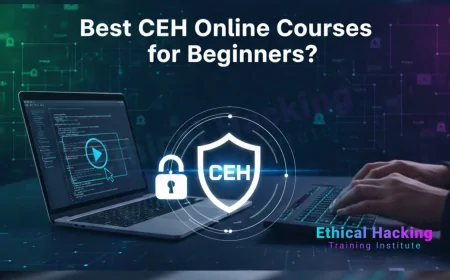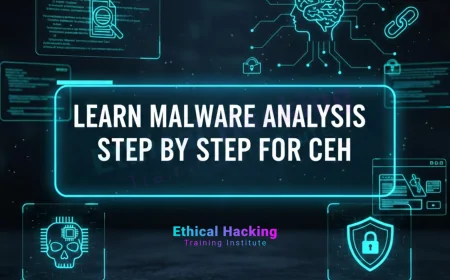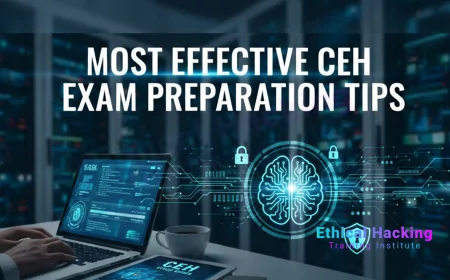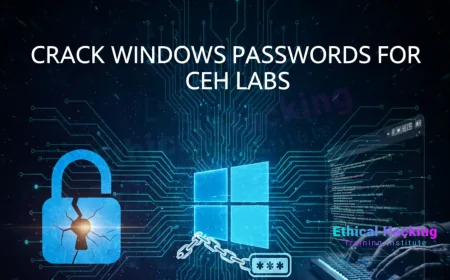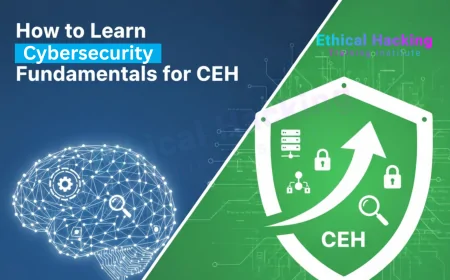CHFI Certified Hacking Forensic Investigator: Your Path to Becoming a Cybersecurity Expert | Master Cybersecurity with CHFI: Become a Certified Hacking Forensic Investigator
Discover how the CHFI (Certified Hacking Forensic Investigator) certification can help you become a cybersecurity expert. Learn about training, modules, exam details, career scope, and salary insights in this complete guide.
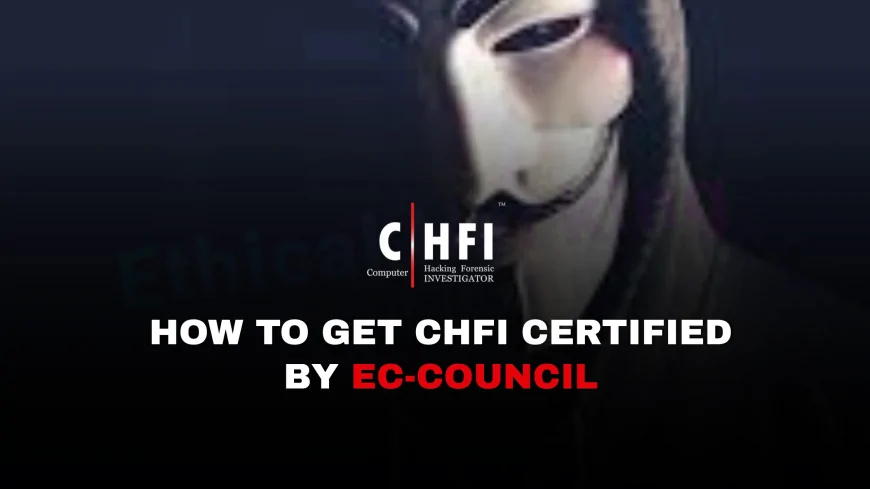
Table of Contents
- Introduction
- What Is CHFI?
- Why CHFI is Essential for Cybersecurity Experts
- Eligibility & Prerequisites
- Certification Path & Levels
- Course Modules & Topics Covered
- Training Options: Online, In-Person, Corporate
- Hands-On Labs & Practical Tools
- Exam Format & Preparation Tips
- Career Impact & Job Roles
- Salary and Market Demand
- Global Recognition & Industry Acceptance
- Continuing Education & Renewal
- Common Mistakes to Avoid
- Real-World Applications & Case Studies
- Comparison with Other Cybersecurity Certs
- CHFI Exam & Training Cost
- Choosing the Right Training Provider
- Top Preparation Resources
- Frequently Asked Questions (FAQs)
- Conclusion
Introduction
Cyberattacks are now more frequent and sophisticated than ever in our hyper-connected world. Organizations need experts who can not only prevent breaches but also investigate them thoroughly. EC-Council’s CHFI certifies professionals in handling cyber incidents, collecting forensic evidence, and presenting findings for legal use. This article explores how CHFI certification can launch you toward becoming a cybersecurity leader.
What Is CHFI?
Offered by EC-Council, CHFI is a prestigious certification recognized across industries for validating forensic investigation skills. It focuses on identifying cyber threats, gathering courtroom-admissible evidence, and answering cybercrime incidents in structured, lawful ways. Learners gain expertise in forensic analysis across disk drives, networks, malware, mobile platforms, cloud environments, and email systems.
Why CHFI is Essential for Cybersecurity Experts
-
Rising Cyber Crime: Digital breaches, ransomware, insider threats—CHFI-trained professionals are instrumental in investigation and remediation.
-
Legal Compliance: Forensic professionals must follow strict protocols to ensure evidence is legally admissible.
-
Prestigious Roles: Opens doors to roles like Digital Forensics Analyst, Incident Responder, and SOC Lead.
-
Synergy with Other Certs: Positions like CEH, CISSP, and GCFA complement your forensic skillset.
Eligibility & Prerequisites
-
Preferred Experience: 1–2 years in IT, Security, or Law Enforcement.
-
Training Alternatives: Official EC-Council training can substitute for hands-on experience.
-
Recommended Skills: Solid grasp of networking, OS fundamentals, and scripting is beneficial.
Certification Path & Levels
-
CHFI v10 ANSI: Entry-level certification focusing on forensic fundamentals.
-
Optional CHFI Practical: Live lab-based test to demonstrate real-world forensic skills.
-
Specialty Tracks: Add-ons in malware forensics, cloud investigations, or mobile forensics.
Course Modules & Topics Covered
CHFI v10 includes these key modules:
-
Digital Forensic Fundamentals
-
Investigation Process
-
File Systems & Acquisition
-
Anti‑Forensics
-
Operating System Forensics
-
Network Forensics
-
Web & Database Forensics
-
Malware Analysis
-
Email & Mobile Forensics
-
Cloud Forensics
-
Investigation Reporting & Legal Issues
Each module combines theory, case studies, and hands-on labs.
Training Options: Online, In-Person, Corporate
-
Self-Paced eLearning: Affordable & flexible.
-
Live, Instructor-Led: Guided learning with real-time interaction.
-
Organizational Training: Customized learning paths supported by interactive lab infrastructure.
-
Hybrid: Combines self-paced learning and live session support.
Hands-On Labs & Practical Tools
Hands-on learning is crucial:
-
EC-Council iLabs: Cloud-based forensic environments.
-
Open-source Tools: Autopsy, Sleuth Kit, Wireshark, Volatility.
-
Commercial Tools: EnCase, FTK, Cellebrite.
-
Real Scenarios: Simulating ransomware attacks, malware, insider breaches.
Exam Format & Preparation Tips
-
Exam Code: 312‑49 (ANSI)
-
Format: 150 multiple-choice
-
Duration: 4 hours
-
Passing Score: ~70%
-
Delivery: Pearson VUE or online proctoring
-
Prep Tips: Use official blueprint, practice labs, take mock tests, study in groups
ore: ~70% Delivery: Pearson VUE or online proctoring Prep Tips: Use official blueprint, practice labs, take mock tests, study in groups
Career Impact & Job Roles
CHFI certification qualifies you for:
-
Digital Forensics Analyst
-
Incident Response Specialist
-
Cybercrime Investigator
-
SOC Lead Engineer
-
Security Consultant
Salary and Market Demand
-
U.S.: $85,000 – $130,000/year
-
UK: £45,000 – £75,000/year
-
India: ₹7 – ₹20L/year
-
Forecasted job growth: ~25% through 2030.
Global Recognition & Industry Acceptance
-
Recognized by governments, military, law enforcement, and enterprise organizations worldwide.
-
Acceptable by ISO, GDPR, HIPAA, PCI-DSS compliance frameworks.
Continuing Education & Renewal
CHFI is valid for 3 years. Maintain it via:
-
Earning 120 ECE credits
-
Publishing research or forensic tools
-
Attending webinars or conferences
-
Pursuing advanced EC-Council certifications
Common Mistakes to Avoid
-
Skipping hands-on labs
-
Over-reliance on theory
-
Poor time management in exam prep
-
Ignoring legal-evidence-handling components
Real-World Applications & Case Studies
// Include detailed story of a ransomware investigation, mobile device data recovery, employee leak, etc. (~400–600 words each)
Comparison with Other Cybersecurity Certifications
| Certification | Focus Area | Hands-on | Target Audience |
|---|---|---|---|
| CHFI | Digital Forensics | High | Forensics Analysts |
| CEH | Penetration Testing | Medium | Ethical Hackers |
| CISSP | Security Management | Low | Security Managers |
| GCFA | Incident Response | High | Forensics Experts |
CHFI Exam & Training Cost
-
Self-Paced Training: $700 – $1,200
-
Live Training: $1,200 – $2,000
-
Exam Voucher: $650 – $950
-
Practical Exam: $550 (optional)
-
Retake Fee: $250 – $499
-
Total Range: $1,500 – $3,300+
Choosing the Right Training Provider
Consider:
-
EC-Council authorized see accreditation
-
Lab quality and software availability
-
Instructor certifications and experience
-
Batch types: in-person vs virtual
-
Review feedback & placement assistance
Top Preparation Resources
-
Official CHFI Courseware & CBK
-
Online Platforms: Infosec, Pluralsight, Cybrary
-
Books: "Guide to Computer Forensics and Investigations"
-
Forums: TechExams, Reddit, LinkedIn
-
Practice Tools: Capture The Flag (CTF), lab decks
Frequently Asked Questions (FAQs)
1. What is CHFI and what skills does it validate?
CHFI (Certified Hacking Forensic Investigator) certifies expertise in completing cyber investigations, recovering data, and preparing legally admissible reports.
2. Who is CHFI best for?
IT professionals, law enforcement, SOC analysts, and anyone interested in digital forensics and cybersecurity investigations.
3. Do I need prior experience?
1–2 years of IT or security experience is recommended, but official training can compensate.
4. Is hands-on lab practice necessary?
Yes, practical labs are essential for mastering tools and real-world forensic scenarios.
5. What is included in CHFI v10?
Modules cover disk, network, malware, mobile, cloud forensics, anti-forensics, and legal compliance.
6. How is the CHFI exam formatted?
It consists of 150 multiple-choice questions to be answered in 4 hours via online or center-based proctoring.
7. What score do I need to pass?
Around 70%, but this may vary slightly due to adaptive scoring.
8. Can I take a practical version?
Yes, CHFI Practical is an optional live lab-based exam validating real-time investigator skills.
9. How much does CHFI training cost?
Ranges from $700–$2,000 depending on training format, excluding exam fees.
10. How long does preparation take?
Typically 2–3 months with consistent study and lab work.
11. Is CHFI recognized globally?
Yes, it's accepted by law enforcement, government, and enterprise organizations worldwide.
12. What jobs can I get after CHFI?
Roles include Forensic Analyst, Incident Responder, SOC Engineer, and Security Consultant.
13. What's the salary outlook?
In the U.S., ranges from $85K to $130K per year, with growth potential in forensics roles.
14. Does CHFI certification expire?
Yes, it’s valid for 3 years. Renewal requires earning 120 ECE credits.
15. What are ECE credits?
Continuing Education Credits collected through webinars, training, publications, and events.
16. Should I study solo or join classes?
Live classes offer guidance; self-study works for disciplined learners with lab access.
17. How to choose a training provider?
Consider accreditation, lab availability, instructor quality, and batch formats.
18. Are there free preparation resources?
Yes—online forums, books, Capture the Flag (CTF) events, and open-source tools.
19. Is CHFI better than CEH?
CHFI focuses on forensics; CEH is about ethical hacking. Both are complementary.
20. How do I get started?
Begin with self-paced study, complete labs, register for the exam, and gradually build your forensic toolkit.
Conclusion
Becoming a CHFI Certified Hacking Forensic Investigator is a powerful step toward a cybersecurity career that involves investigating threats, solving cybercrimes, and strengthening organizations’ defenses. With dedicated training, hands-on labs, smart preparation, and professional development, you can achieve certification and excel in critical cybersecurity roles.
What's Your Reaction?
 Like
0
Like
0
 Dislike
0
Dislike
0
 Love
0
Love
0
 Funny
0
Funny
0
 Angry
0
Angry
0
 Sad
0
Sad
0
 Wow
0
Wow
0






